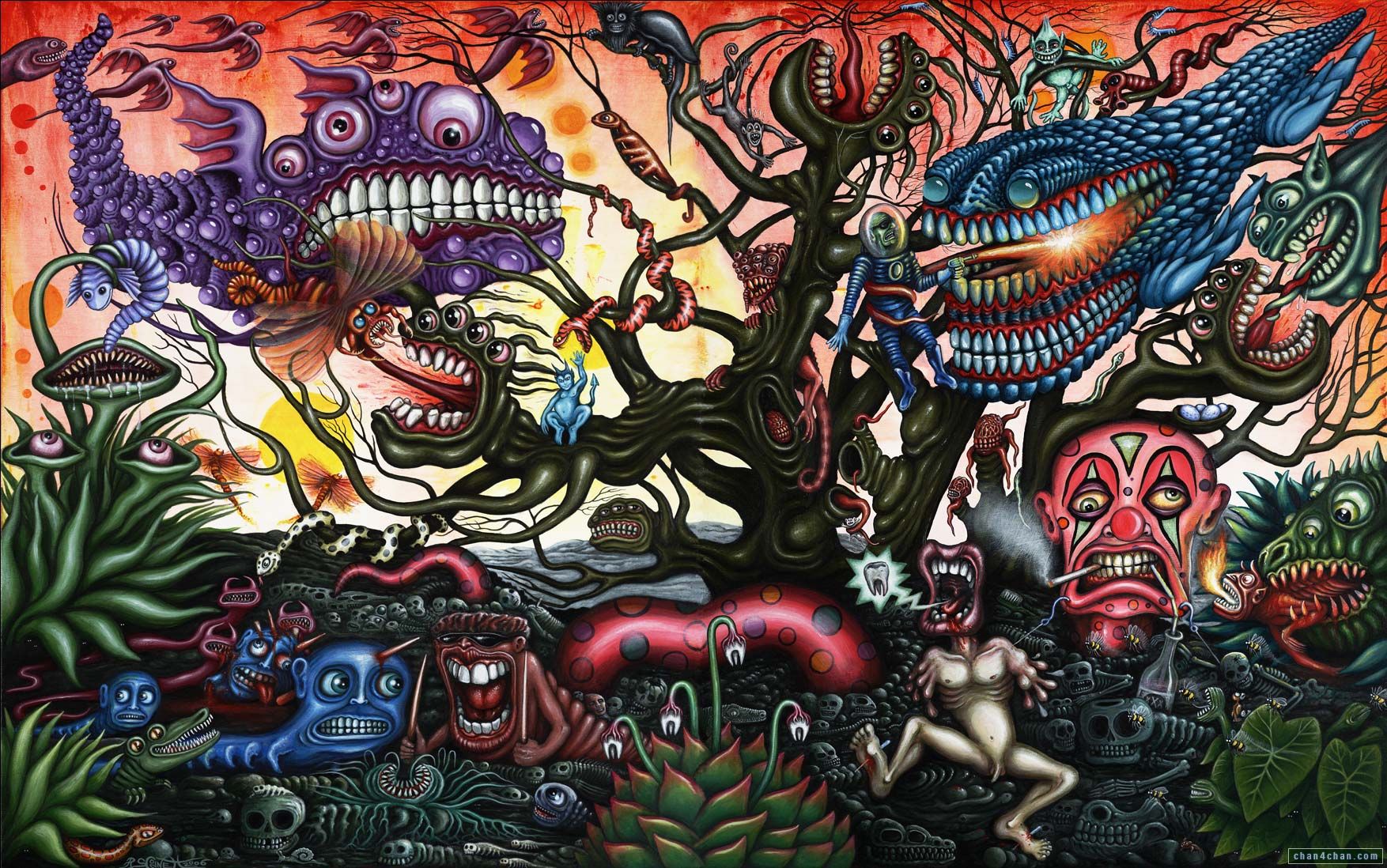We live in an impoverished environment and – because we have grown used to it – we think that this is normal. We think that this is the only way things can be. Impoverishment, and how to survive impoverishment, has become a way of life for us. It’s all we know.
We are not talking about financial impoverishment here (which is how we would probably tend to take it) but the informational variety, which has to do with how much depth our environment has, how much ‘uncharted stuff’ lies beneath the obvious, beneath the presented surface that we immediately encounter. When we live for example in a world that is made up of descriptions, ideas, and mental images, etc, then there is no depth to the setup at all. We live in a ‘world of the obvious’; we never look beneath the surface because the surface tells us everything we need to know. There is never any depth in the Hyperreal in other words, and it just so happens that the world we do live in (for the most part) is ‘the World of the Hyperreal’.
The usual way to talk about hyperreality is to say something to the effect that it is a virtual reality construct made up of our symbolic representations of the world rather than the world itself. This is a kind of cheat therefore because it’s far easier to relate to ‘the realm of rational representations’ than it is to relate to the world which they supposedly represent. Another, possibly less familiar way of talking about it will be to say that the Realm of Hyperreality is that world which seems exactly the same to all of us. It’s the ‘one-size-fits-all’ world; the world that is exclusively made up of generic thoughts and images.
On the face of it, this does not seem like an unduly strange proposition – we take it for granted that the world is the same for all of us. Our communication system is based on this premise. This assumption of ours soon gives away however when we reflect on the fact that every artist who ever lived shows us a different and unique world through their work. If that wasn’t the case then the work in question simply wouldn’t be art; it would be something quite different – it would be ‘a generic representation’. It would be ‘copying’ rather than ‘creativity’.
When we find ourselves living in the World of Generic Appearances, the world which is exactly the same for you as it is for me (and for anyone else who might happen to inhabit it) then we are living in a world that has the property of denying all individuality. Individuality never sees things in the officially approved way, after all – that would be a contradiction in terms. The individual is the one who rebels against the consensus way of seeing things, and does not believe in the unquestionable validity of this view, not the one who tacitly agrees (without ever reflecting on what this agreement of theirs means) to accept the generic viewpoint in place of their own. We could of course (if we wished) argue that there isn’t really such a thing as this essential ‘individuality’ that we’re talking about, since reality only is what it is and there is only the one Right Way to see it. How can there be more than one way of seeing things or describing reality, after all? That – as we must surely all agree – lies in the face of all common sense. Where’s the sanity in that?
What we should say, however, is that there is only one way of looking at a ‘positive’ or ‘stated’ reality. A positive reality is one that can only be looked at in one particular way, the way which it itself takes for granted. If a red warning lights flashes up on the dashboard of your cup telling you to ‘Stop this car’ then there is of course only one way of interpreting this message – any other way of understanding it (i.e. interpreting it as meaning ‘Carry on driving’) is clearly wrong and is liable to cost us dear on this account. There is only the one, prescribed way to look at a defined reality but the thing is that a ‘positively defined reality’ isn’t reality itself but what we do with reality. It’s our own construct, in other words. We might assume that the world comes complete with its own inbuilt definitions of itself but it doesn’t; any definitions (or descriptions) have to come from us. All ‘conclusions’ have to come from us – they don’t come as ‘part of the package’ at all.
The whole point of reality (if it can be said to have a point) is that there isn’t just the one way to look at it. If there was then what we would be looking at would be a description of reality, and that’s an entirely different kettle of fish. We can look at the world in many as many different ways as we want, but none of our descriptions or ways looking at the world equal the world. Instead of talking about reality we could instead talk about space – space is the ultimate reality after all. Space is the ‘unconditioned reality’. Very clearly, there’s no ‘right’ way to look at space; space – being space and not form – is quite devoid of structures or characterization and this means that there are no ‘angles’ associated with it. There’s no way to read it. Space contains all possible ways of ‘looking’ but it itself is not a way of looking. It itself is neither ‘a viewpoint’ nor ‘a statement about things’.
All descriptions are equal when it comes to space – all possible descriptions are equally true and all possible descriptions are equally false. The ‘truth of space’ is the absence of all definite truths and if we don’t know this then we don’t know anything about space! If there was a correct description of space then it would no longer be space. Space would have to stop right there but space doesn’t stop, space never comes to an end. If there was a definite conclusion that we could come to about space then space would no longer exist – definite conclusions are the absence of space. The reason the world we create for ourselves is an impoverished one – as we started off by saying – is that what we understand to be ‘a world’ is actually a determinate structure (or – in other words – a game). There is only the one ‘right way’ to interact with a game and so all other possibilities are cut off right from the very start. Our environment – because it is so limited – defines everything about us. It really and truly ‘tells us who we are’. It provides us with our ‘identity’.
If we have to be who or what the determinate environment tells us we are (so that we are nothing more than ‘a faithful reflection of the template’, so to speak) then this is without question ‘an impoverished situation’. There is a tremendous impoverishment of possibilities going on here – not least of which is the possibility of being who or what we actually are! Faced with an impoverishment as drastic as this – the impoverishment of our very being, the radical deficit of our actual nature – we might wonder how we manage to get by in life at all, and yet we plainly do, in some kind of fashion at least. Impoverishment is the only way of life we know, as we said earlier, and so we see nothing wrong with it. We don’t have any ‘real possibilities’ available to us in the Determinate Environment (that being the whole point of the DE) and what this means is that there is another possibility – the possibility of happily (or unhappily) believing in all sorts of false (or unreal) possibilities!
This is of course what all games rely on – games are made up of unreal possibilities, obviously. There are no true possibilities in a game! There are actually only two possibilities here and those are ‘winning’ and ‘losing’. Both of these two possibilities are entirely unreal and yet this doesn’t at all stop us playing the game. Both winning and losing are ‘unreal possibilities’ because neither of these two states has anything to do with who we really are; they only have significance in relation to ‘who the game says we are’. Both ‘winning’ and ‘losing’ equal impoverishment, in other words; they are both ‘virtual states’ and so they both equal ‘lack of being’. We yearn to win more than anything else in the whole world, we yearn desperately to win as if this would remedy all our ills, but – all the same – winning brings us nothing. Winning is meaningful only to the false idea of who we are, the role we play without knowing that we are playing it.
What this shows is that it is quite possible to live a life where we are identified with an unreal sense of self and where nothing we do can ever cure the deficit at our core since we are always acting out of a false basis. We don’t get anywhere with our efforts because we’re striving to attain false possibilities – possibilities that are pure projections on our part. It’s entirely possible to go through life like this; it is entirely possible but at the same time it’s not very fulfilling! All we’re really saying is that it is entirely feasible to live in an impoverished way and to be very busy the whole time grasping after phantoms, phantom appearances that have been given life by the endless unacknowledged hunger we have inside ourselves. There is no big news here therefore; this is a very normal and unremarkable situation – what we talking about here is simply ‘unconscious life’ or ‘unconscious living’. This is what it all comes down to – one illusion chasing another illusion (or one illusion fleeing another illusion). This is the situation of the ‘subject-illusion’ relating to the ‘object-illusion’ as if the ‘object-illusion’ were something quite different to itself, which it isn’t… This is how things are when we are operating on the basis of ‘Deficit Motivation’; we never get anywhere but all the same we keep on hoping. We keep on hoping and we keep on trying…
The system runs us as ‘deficiencies of who we really are’, which might sound rather far-fetched but which is actually perfectly feasible, as we have been saying. Aren’t we living on a planet where billions of people are caught in this exact trap, and whose goal-orientated activities are powering all the structures that exist in society? Arguably, this wouldn’t have been so much the case in the past because Hyperreality hadn’t yet really come into being – information processing technology needs to exist before they can be properly running hyperreality, hyperreality which doesn’t ever get disturbed the natural world. A culture where high technology where the necessary technology hasn’t yet come online is a culture that is still in touch with life in the raw’, to whatever extent, and it is there that our only chance of ‘liberation from the game’ can be found.
As we move faster and faster in the direction of creating and managing our own Total Environment then our chances of freedom (our chances of living a genuinely meaningful life) very rapidly decrease. Everything becomes tautological; everything becomes an echo of our own ideas, our own limiting assumptions. When we ourselves are responsible for engineering our own environment then our ‘chances’ (or our possibilities) quickly settle down to zero. The only existence we can ever have within the Designed Environment is the deficiency-based type of existence which is where we ‘exist’ as the absence of who we truly are. This is Plato’s cave of shadows.
Once we are in this situation then the system can exploit us to the limits of our endurance; it can exploit us freely since the only way we can see to remedy our situation lies in playing the game that society offers us. We have no choice of doing anything else anyway. The whole business of living in an impoverished environment can be summed up in two points – [1] The IE will only give us one way of seeing things and [2] This one way of seeing things doesn’t include the possibility of stopping to consider that there might be worlds outside of the limited one that the system has created for us. What else are we going to do in this case other than put all our money on learning to play the game better? If we aren’t getting anywhere then the reason must be that we weren’t playing the game skillfully enough or determinedly enough – it can’t be the case that the game itself as a dud! It can’t be the case that the game is – in fact – nothing other than the Nullity in disguise.






